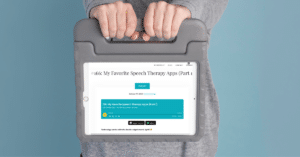Listen on Apple Podcasts Listen on Spotify
This Week’s Episode: SLP Data Collection in Mixed Groups
This month we have been discussing all things data. 🤓
We started out this series with the importance of probe data, when to take it, and why we take it. Last week I shared tips on how to stay organized while collecting data and this week we will touch on strategies for collecting probe data in mixed groups!
I know how difficult it can be to stay organized with mixed groups. But let’s continue to build on this month’s podseries and take the tips that we’ve already talked about and apply them to our mixed groups.
Let’s get to simplifying, organizing and recording our probe data!
Strategies + Tips Discussed:
Step 1: Get Organized
Step 2: Make it Quick
Step 3: Set a Routine
Join our Free Digital Data Bootcamp
Do you want to learn how to set up and customize the digital data collection system that’s helped SLPs save an average of 180 hours per school year for your caseload…no matter its size or diversity. You can… in as little as 5 days! Join the Digital Data Bootcamp today!
Subscribe & Review in iTunes
Are you subscribed to the podcast? If you’re not, subscribe today to get the latest episodes sent directly to you! Click here to make your listening experience auto-magic and as easy as possible.
Bonus points if you leave us a review over on iTunes → Those reviews help other SLPs find the podcast, and I love reading your feedback! Just click here to review, select “Ratings and Reviews,” “Write a Review,” and let me know what your favorite part of the podcast is.
Thanks so much!
Transcript
Marisha: Hello there and welcome to the SLP Now podcast, where we share practical therapy tips and ideas for busy speech, language pathologists. Grab your favorite beverage and sit back as we dive into this week's episode.
Marisha: Hey, there. It's Marisha and welcome to the SLP Now podcast. This month, we are diving into all things data collection. We'll start off by talking about collecting probe data and why we would even want to do that. Then we'll talk about organizing the probes, strategies to collect data in groups and then how to document therapy data. So without further ado, let's get started with this week's topic.
Marisha: Now, let's dive into strategies to collect probe data in a group. We chatted about a lot of different strategies last time, like the main strategy being goal cards and making that part of your routine. When students walk into the therapy room, they grab their goal cards. If you're doing teletherapy, when they join the session, they pull up their goal cards. Then if you have multiple students in the group, the main focus while other students are doing their probes is just for them to review their goals. They can look through their goals and be reminded of what they're working on in speech.
Marisha: Goal awareness is a huge factor in progress. So you can even have like a little quiz or like pop quiz kind of thing, where you ask them, like "Who can name all of their goals?" or something. So that'll motivate them to review their goals and of course over time, they're going to [inaudible 00:01:52] have their goals memorized so that will get less exciting, but it can still be a fun way, like, "Who can tell me all of their goals?," and six months into the IEP, it would be super impressive if they can just rattle off all the things that they were working on. So I think it is a nice way to keep them engaged for the most part, we just might not have to switch it up a little over time.
Marisha: So that is the main strategy that I use to collect probe data. I find that that keeps most students engaged enough for the few minutes that I need to take probes on other students in the group. Then if that's not working, here are some additional strategies that we can use to make this a little bit more streamlined and doable and just like nice and easy. I like it when things feel easy in the speech room.
Marisha: So one is like, is your organization up to par? Is it hard for students to find their goal cards? Are they triggering some behavior because they're like, "I can't find my cards," and blah, blah, blah. So how are you organizing the goal cards? How are students gathering them? Is that an easy thing to do?
Marisha: In the last episode, I talked about how I have a calendar pocket chart that I use and students know exactly where to go to grab their cards so it's a very easy process. They just grab them, they sit down, there's no challenges in that process. It's really easy for them to do. So making sure that we're organized in terms of getting the goals.
Marisha: And then are we organized in terms of the probes as, are we spending a bunch of time flipping through pages, trying to find the right thing? Because if we're a little disheveled and anxious or like, "Ah, where are the probes?" then the students will pick up on that energy and react to that as well. So can you make the process even more streamlined to grab your probes? And definitely check out the previous episode in terms of how to keep them organized so that you can quickly access your probes, there's just seconds in between each one, whether you're using a binder or doing that digitally, make it really easy to grab those probes and access them.
Marisha: Then the next step, if you're still struggling with that, maybe to review your routine. Like, what does it look like? Do the students know that they come into the speech room, they grab their goal cards? Maybe having a visual and just setting the expectation. What does it look like when our other students are doing their probe? Like, we have quiet hands and feet potentially and we can be creative and use our clinical judgment too on what is most appropriate. But again talk about, what does it look like when other students in the group are doing their probes? Are we screaming and yelling and jumping in with answers or are we sitting quietly and looking at our goals, just setting the expectations and showing what a successful routine would look like and praising it when we see it. It might be hard for some students and just praising every step in the right direction so that we can get through those probes and really set our students up for success.
Marisha: And just like I explained to you in the first episode of this series why it's important to collect probe data, we can explain that to our students too. If a student is making it hard for another student to complete their probe data, that can really have an impact. So just sharing about the why and why it's important, those strategies typically do the trick for me, but I wanted to share just a couple more ideas just in case that doesn't work for your group.
Marisha: One thing that you can do, if they're really solid on their goals, you can give them some of the visuals. It gives them a little bit more to look at. So you can give them the visuals for their goal, or you can have them go grab their visual. So while they're waiting their turn, they grab the visual for the goal that they're targeting that day and they can take a quick look at it.
Marisha: Another thing that they can do is, if you're going to do a book, while they're waiting, they can do a book walk and look through the book and kind of prime themselves for what they're going to do. You can also have them actually read the book while they're waiting. They won't get very far because these probes are very, very quick, but they can start to read or review the article for the day.
Marisha: If they have speech sound goals and are at a higher level, they can try and find their sound in the book or in the article and that can be a good strategy. Maybe if they're is an activity that requires a little more time, like if two of your students have a comprehension goal and you need to read like a little passage and ask questions about that and the other student just has a super quick probe, maybe you can have an activity ready to go for that student. Maybe they can do something on the iPad related to their skill. There's so many different scenarios, but if that makes sense, that's something you can do.
Marisha: But I really don't think you need to spend a lot of time finding activities. I think just getting the progress organized, making it seamless process to grab the goal cards, you pull up the probes super quick, you gather the probes super quick and then you're good to go. I mean, it depends on the group and the goal, but I shoot for 5 to 10 items and I try and keep it nice and quick and streamlined.
Marisha: Another option too, like if maybe there's just some different goals that require a little bit more time, you can just pull the students separately, like once a month or every quarter, just to check in on a specific goal that's maybe a little bit harder to do a quick probe on, but I really think this works for the majority of students. And of course we're using our clinical judgment to adjust if we're feeling like, "Well, maybe this isn't the most representative," or maybe we need to just change things up a little bit. But those are my top strategies to make this easy and a really effective practice.
Marisha: But yeah, that's all for now. Then next week we are going to talk about documentation and how we document the probe data, how we document the support that we provide in the actual session and all sorts of good stuff. It's going to be a good one. So join us next week.
Marisha: Then if you want to check out the show notes for today's episode, you can go to slpnow.com/112. Again, that's slpnow.com/112, and we will see you next week.
Marisha: Thanks for listening to the SLP Now podcast. If you enjoyed this episode, please share with your SLP friends and don't forget to subscribe to the podcast to get the latest episode sent directly to you. See you next time.
Sign up to receive email updates
Enter your name and email address below and I'll send you periodic updates about the podcast.




Reader Interactions